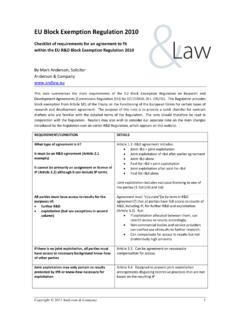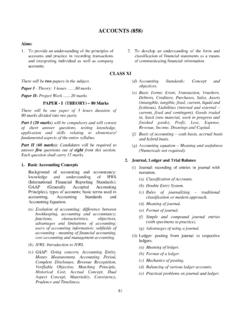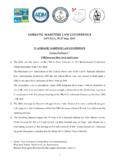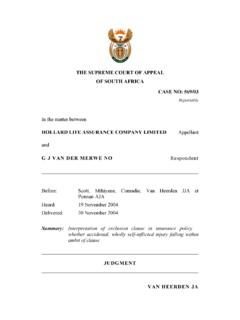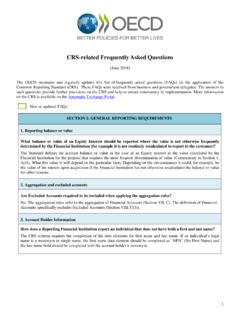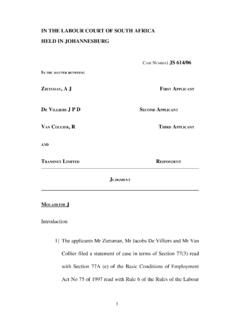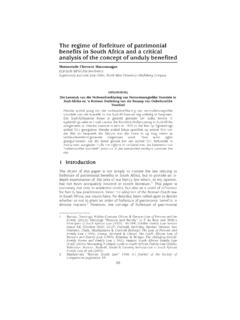Transcription of Syllabus for a Post-graduate Diploma in Intellectual ...
1 Syllabus for a Post-graduate Diploma in Intellectual property transactions Contents 1. Purpose and outline of the course 2. Course content 3. Course outcomes 4. How the course will be taught 5. How the course will be assessed 6. Reading list 7. Scope for linking with other courses ( LLM) 8. Further information Mark Anderson Anderson Law LLP 76 Wallingford Road Shillingford Oxfordshire OX10 7EU Tel: 01865 858 878 Fax: 018658 858 900 Draft 22 July 2011 Mark Anderson 2 1. Purpose and outline of the course This course is designed for lawyers, patent attorneys, trade mark attorneys, licensing executives and others (together, practitioners ) who are involved in the drafting, negotiation or review of Intellectual property ( IP ) agreements. It is intended to provide an in-depth knowledge and understanding of: (a) IP laws that directly affect the creation, transfer, and licensing of, and other dealings in, IP ( IP transactions ); (b) The effect of other commercial laws on IP transactions , including contract, employment, competition, tax and insolvency; (c) Effective drafting of IP agreements; and (d) Legal and commercial practice in relation to IP transactions .
2 The course will combine a rigorous study of relevant legal principles with a practical focus on how IP transactions are structured, drafted and negotiated, across different industry sectors. Those industry sectors include information and communications technology ( ICT ), engineering, biotechnology and pharmaceuticals, publishing, entertainment, and fast-moving consumer goods ( FMCG ). Many, or most, IP transactions are international in character. Some IP laws and other laws have been harmonised between countries, and there has been some convergence of international commercial practice. The course will focus primarily on English law, but will include examples of how law and practice differ or are similar across jurisdictions, including both common law jurisdictions (eg those in US, Australasia), and civil law jurisdictions (eg those in Continental Europe). This course is designed to complement, and not compete with, other courses that focus on Intellectual property law and practice, and whose centre of gravity is either the protection of IP or the enforcement of IP rights.
3 2. Course content What is Intellectual property (IP)? This section of the course will examine the different types of IP and quasi-IP that are the subject of IP transactions , and will take an initial look at the legal principles that govern each type; this will provide an introduction to the more detailed examination of legal issues in later sections: (a) Types of registered and unregistered IP (b) Applications, and the right to apply, for registration (c) Confidential information and trade secrets (d) Regulatory protection and quasi-IP, eg product registrations, data exclusivity, orphan drug status (e) property rights in biological materials, R&D data, etc (f) Other IP-ish rights, eg priority right (g) IP distinguished from contractual rights (h) IP as a category of personal property (i) IP in other countries Draft 22 July 2011 Mark Anderson 3 Creating IP This section will examine how IP is created and who owns it when it is created, including both the underlying law (for different types of IP), and how ownership is addressed in various types of contract in various industry sectors.
4 (a) Generally (b) Employees (c) Consultants (eg design consultants) (d) Contractors and commercial collaborators (eg research collaboration agreements) (e) Automatic creation of IP (eg by certain software) (f) Creation of IP by a directing mind (eg films) Rights, title and interests in IP This section will examine the different types of IP interest, the legal implications and features of each type (including how these property interests are distinguished from contractual rights) and how these interests are created and managed in IP agreements: (a) Creators, applicants and owners (b) Co-ownership (c) Absolute and determinable interests (d) Legal and equitable interests (e) Mortgages and other security interests over IP (f) Trusts of IP (g) Other property rights in IP, distinguished from contractual rights (h) Registration of interests Transferring ownership of IP This section will examine legal mechanisms for the transfer of IP and the legal and practical issues that arise in each case, including situations where assignments may be legally defective (eg following Edwards v Cook), and whether contractual obligations in assignments are binding on subsequent owners of the IP.
5 (a) Assignments generally (b) Absolute and conditional assignments (c) Agreements and options to assign (d) Transfer by operation of law (e) Reversion of IP (f) Registration of IP transfers Licensing IP This section will look in detail at the grant of IP licences, examining the laws governing different types of IP licence, and legal and commercial practice in different industry sectors and territories: (a) Voluntary and compulsory licensing (b) Bare licences and contractual licences (c) Express and implied licences, including licences arising on the sale of products (d) Exclusive, sole and non-exclusive licensing; sublicensing; duration and revocability (e) Licensing in different territories, fields and markets (f) Licensing in different industry sectors (g) Registration of licences Draft 22 July 2011 Mark Anderson 4 Drafting and interpreting IP agreements This major section of the course will examine issues of law (particularly contract and tort law) and practice that affect the drafting and interpretation of IP agreements, including case law on the interpretation of IP agreements, and best practice in relation to the drafting of IP agreements: (a) The general approach of the English courts to construing contracts; express and implied terms; selected case law on the interpretation of provisions found in IP agreements; comparison with other jurisdictions; (b) Best practice in structuring and drafting contracts, and IP agreements in particular.
6 (c) Clause-by-clause discussion of commonly-encountered terms in IP agreements, including clauses dealing with definitions, work, payment, IP ownership and use, confidentiality, diligence, IP management, quality control, regulatory compliance, non-compete clauses, warranties and liability, termination and its consequences, law and jurisdiction, and boilerplate clauses; variations in these clauses in different industry sectors; and (d) IP agreements in different commercial settings, including: (1) corporate transactions ; (2) biotechnology and pharmaceutical licensing; (3) ICT transactions ; (4) publishing and media transactions ; (5) branding, merchandising, promotions, etc; and (6) IP agreements arising from settlement of disputes, including co-existence agreements. Legal constraints on IP transactions This section will examine several distinct areas: laws that affect the terms that may be included in IP agreements; and laws, industry regulations and codes of conduct that may constrain the activities of parties to an IP agreement and which may be reflected in the terms of the IP agreement, including: (a) Unfair terms in commercial contracts (b) EU and national competition laws, including Article 101 and the block exemption regulations; overview of Article 102 and free movement of goods.
7 Comparison with other jurisdictions (eg US) (c) Export control laws (d) Selected industry regulations and codes of practice (eg regulations governing the clinical trials of pharmaceutical products, or governing the sale of electrical products) Taxation of IP transactions This section will consider the effect of tax laws upon IP transactions , including how IP agreements are structured and drafted to take account of such laws: (a) Income and corporation taxes (b) Double taxation treaties (c) Tax avoidance and evasion (d) Value Added Tax and sales taxes (e) Stamp duties (f) Tax incentives for IP transactions , investments and businesses Effect on IP rights of adverse events: bankruptcy, insolvency, dissolution and death This section will examine selected areas of law that can affect the owners and holders of rights in IP, and associated terms in IP agreements, including: (a) the effect of insolvency and bankruptcy on obligations under an IP agreement Draft 22 July 2011 Mark Anderson 5 (b) the consequences of the death of an IP owner, including use of literary executors (c) bona vacantia in respect of IP assets and dissolved companies 3.
8 Course outcomes The course will provide students with: (a) A detailed knowledge and understanding of the core elements of IP law that govern and affect IP transactions ; (b) Knowledge and understanding of the wider legal framework for IP transactions , across a range of legal disciplines, including property , contract, competition, tax and insolvency laws; (c) Skills in the structuring and drafting of IP agreements; (d) Skills in the interpretation of IP agreements and assessment of their legal effect; (e) Knowledge and understanding of the terms of typical IP agreements across selected industry sectors; and (f) An awareness of some of the ways in which, in international IP transactions , laws and practice in other countries may differ from those in England and Wales. As well as providing knowledge and skills that are specific to IP transactions , as described above, the course will further develop students skills, knowledge and understanding in the following areas: (a) Close, critical analysis of legal materials and commercial documents; (b) Applying diverse areas of law (some of which fall outside the mainstream of commercial law practice, eg personal property law, trusts, determinable interests) to commercial situations; (c) Appreciating how commercial practice varies between industry sectors where the underlying transactions are similar; (d) Appreciating how commercial practice and legal theory may diverge, and the importance of standing back from commercial norms and assumptions when thinking independently and giving objective legal advice.
9 (e) Developing and presenting legally-robust arguments for and against terms in commercial contracts; and (f) Writing clearly and accurately in contracts and other legal documents. 4. How the course will be taught The course will be taught primarily by experienced IP practitioners, many of whom are authors or editors of legal textbooks on IP and commercial subjects published by OUP, LexisNexis, Law Society Publishing, Edward Elgar Publishing, Hart Publishing and others. The course programme will include: (a) A two-week residential school; and (b) Five workshops, each consisting of a full day (usually on a Saturday) that will include both formal lectures and tutorial-style discussions in smaller groups. The residential school will provide teaching on core legal subjects, including: x Relevant IP laws x Other areas of commercial law (mentioned above) x IP contract drafting and interpretation Draft 22 July 2011 Mark Anderson 6 A majority of the workshop days will focus on a combination of legal topics, industry sectors and types of transaction in a matrix approach, with both major and minor themes for the day.
10 For example, one workshop day will focus primarily on the ICT and media sectors, copyright and database rights, and various types of agreement encountered in these sectors. These will be the major themes. On the same day, we will also discuss other sectors where copyright is important (eg character merchandising), other types of IP relevant to the ICT and media sectors, and other types of IP transaction encountered in those sectors. These will be the minor themes. This approach will enable both an in-depth discussion of a particular sector/IP type/transaction type, and a broader, more comparative look at other areas. The fourth workshop will take a cross-sector approach and will include a significant focus on corporate transactions and other situations where IP is assigned. The final workshop will be a revision session. In more detail, it is currently envisaged that the workshops will cover the following major themes: Workshop IP type Industry sector Transaction types 1a Copyright and database rights ICT Software supply agreements, commissioning agreements, end-user licences 1b Media and entertainment Publishing agreements, agreements for licensing music, acquiring rights to films, etc 2a Patents and know-how Universities Research collaboration agreements, early-stage licence agreements, material transfer agreements, co-ownership agreements 2b Bio-pharma Development and licence agreements, trials and testing agreements, manufacturing agreements 3a Trade marks, personality rights, design rights FMCG Licence and distribution agreements, talent agreements, character merchandising agreements; co-existence agreements 3b Engineering Consultancy; commissioning agreements.
